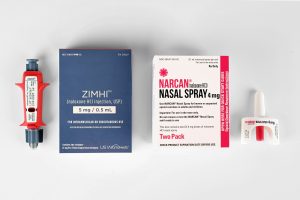What Does Your Pharmacist Actually Do All Day?

Every pharmacist has heard the following:
“So, you just count by 5 all day?”
“Why does it take so long? You just put the pills in a bottle, right?”
“Don’t you just put a label on it?”
“I need my little, white pills refilled.”
“I am out of refills; can’t you just renew my prescription? I’ve been taking this for years.”
“I am allergic to penicillin. Why are you calling my doctor about my prescription for cephalexin?”
“I have had this dry cough that just won’t go away.”
Pharmacists work in a variety of settings- hospital, community, ambulatory care, long term care (LTC), military, veterinary, research and more. We all do things a little bit differently based on our field of practice, but in essence, we all are here to do the same job. That job is to ensure that the correct patient gets the correct medication at the correct dose…the list goes on. The Institute for Healthcare Improvement (IHI) actually calls these the “five rights” of medication administration: the right patient, the right drug, the right dose, the right route, and the right time.
In addition to checking the prescription to make sure that the medication we give you is actually what the doctor intended for you to have and that the directions on the label are correct, a pharmacist is also looking for many other red flags while filling your prescription.
We look to make sure there are no error due to oversight on the doctor’s part. Does the dose make sense? Is there a drug interaction? Do you have any allergies? If so, we need to call the doctor to clarify or get your prescription changed. Sometimes the nurse will take a message and have to call us back, very rarely do we actually get to talk to the doctor on our first phone call. Pharmacists also ensure that prescriptions contain all of the required information so that we can legally dispense the medication.
We make sure we are billing your medication appropriately. Do we have your insurance information on file? Is there a coupon to make the medication cheaper? Would it save you money to fill 90 days versus 30 days? Does your insurance cover the medication prescribed? Some of us are lucky enough to have a billing department to help us with this step of the process (shout out to Morgan, Sherri and Kim of the Corum Billing Department!). But others, like the retail pharmacists that you see in your community, are in charge of looking up insurance information and trying to reduce the cost of your $300 inhaler. Phone calls with insurance companies can often be very time consuming.
We keep up with refills and track your medication fill history. We can usually tell if you are taking too much of a medication or skipping doses. If we filled your insulin prescription 18 days ago for a 30-day supply and you tell us you are out, then you are probably overusing the medication. This overuse can lead to other potentially serious health issues, such as hypoglycemia (low blood sugar) in this case. If you haven’t filled your cholesterol medication in 2 months but we only gave you a 30-day supply the last time, it is possible that you are skipping doses. We want your medications to be as safe and effective as possible, so we can help you to come up with a routine or give tips on remembering to take your medications at the same time each day. We care about your health, so we always try to take the time to counsel you on important information about your medications, as well as answer any of your questions.
The questions that began this post are all real questions that I have heard throughout my years as a pharmacist. I would like to answer them for you now.
“So, you just count by 5 all day?”
Sometimes! But it definitely is not all that I do.
“Why does it take so long? You just put the pills in a bottle, right?”
We do put the pills in a bottle, but now you know all of the other steps that I have to go through first and all of the potential issues that can arise with each prescription.
“Don’t you just put a label on it?”
Sometimes! If there is a prepacked item, like a Z-Pak, I can usually just label the package and this does save a little bit of time. But I still have to make sure it is the right drug for the right patient, no allergies, etc.
“I need my little, white pills refilled.”
Well, there are a lot of little, white pills. But I am a pretty good investigator. Let’s take a look through your profile together and figure out which medication you are referring to.
“I am out of refills; can’t you just renew my prescription? I’ve been taking this for years.”
Legally, prescriptions for noncontrolled medications expire after 1 year from date written. So even if you have been taking your blood pressure medication for 5+ years, we still need a new prescription each time it expires.
“I am allergic to penicillin. Why are you calling my doctor about my prescription for cephalexin?”
Sometimes patients who have allergies to one medication can experience a risk of allergic cross-reactivity. I just want to be sure that your doctor is aware and that you know what to monitor for in case you have a problem.
“I have had this dry cough that just won’t go away. Can you recommend a cough syrup?”
Sure, I can recommend something OTC for you. But first, while looking at your medication list, it appears that you started taking lisinopril a few months ago. Dry, unproductive cough can be a side effect. Let’s talk to your doctor and see what they think.
Pharmacists have many other jobs in addition to what has already been discussed, which varies based on practice location. For example, in our setting, LTC pharmacists often do medication reviews, antibiotic stewardship, fall reviews, and consulting. Next time you go into your pharmacy to pick up a medication or call your pharmacist with a question, you will have a better idea of what all we do!
Written by: Megan Holland, PharmD

Other posts by Megan:
Medication Disposal: How to guide | The Corum Capsule (corumpharmacy.com)



